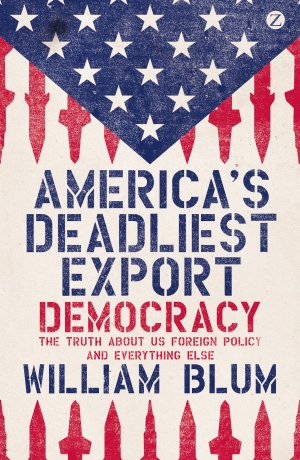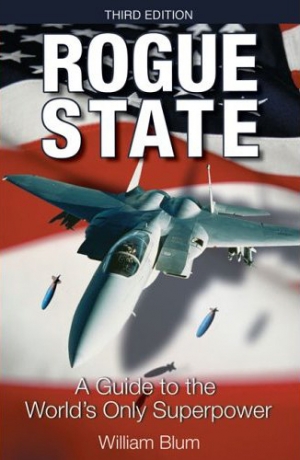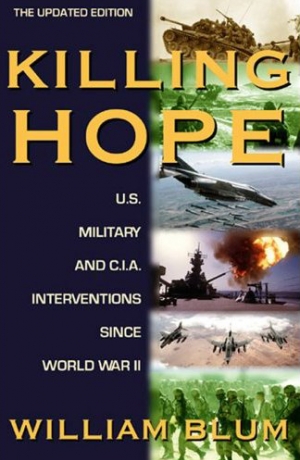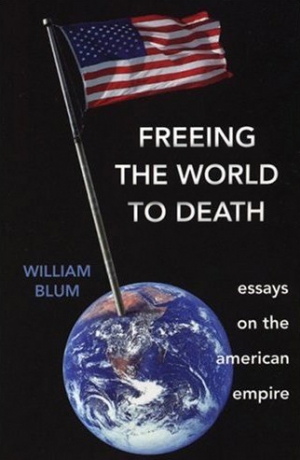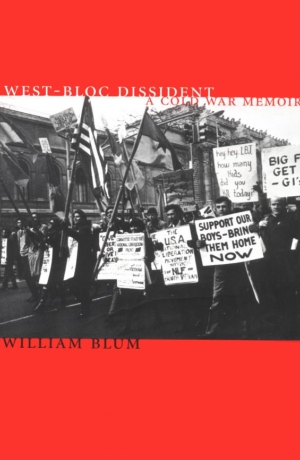War Criminals: Theirs and Ours
I suppose if I had lost the war, I would have been tried as a war criminal. Fortunately, we were on the winning side.
– US General Curtis LeMay, commander of the 1945 Tokyo fire bombing operation. 1
On December 3, 1996, the US Justice Department issued a list of 16 Japanese citizens who would be barred from entering the United States because of “war crimes” committed during the Second World War. Among those denied entry were some who were alleged to have been members of the infamous “Unit 731”, which, said the Justice Department, “conducted inhumane and frequently lethal pseudo-medical experiments – on thousands of … prisoners and civilians,” including mass dissections of living humans. 2 Oddly enough, after the war the man in charge of the Unit 731 program – whose test subjects included captured American soldiers – General Shiro Ishii, along with a number of his colleagues, had been granted immunity and freedom in exchange for providing the United States with details about their experiments, and were promised that their crimes would not be revealed to the world. The justification for this policy, advanced by American scientists and military officials, was, of course, the proverbial, ubiquitous “national security”. 3
Apart from the hypocrisy of the Justice Department including Unit 731 members on such a list while protecting its leaders, we are faced with the fact that any number of countries would be justified in issuing a list of Americans barred from entry because of “war crimes” and “crimes against humanity”. Such a list, of those still alive in 2005, might include:
William Clinton, president, for his merciless bombing of the people of Yugoslavia for 78 days and nights in 1999, taking the lives of many hundreds of civilians, and producing one of the greatest ecological catastrophes in history; for his relentless continuation of the sanctions and rocket attacks upon the people of Iraq; and for his illegal and lethal bombings of Somalia, Bosnia, Sudan, and Afghanistan.
General Wesley Clark, Supreme Allied Commander in Europe, for his direction of the NATO bombing of Yugoslavia with an almost sadistic fanaticism … “He would rise out of his seat and slap the table. ‘I’ve got to get the maximum violence out of this campaign – now!’” 4
George H. W. Bush, president, for the death of more than a million innocent Iraqi citizens, the result of his 40 days of bombing in 1991, the deliberate ruination of the public water supply, the widespread use of depleted uranium weapons which has brought continuing suffering to many thousands of American servicemen and to many more Iraqis, and for the institution of draconian sanctions against Iraq, which lasted 12 years.
For his unconscionable bombing of Panama in 1989, producing widespread death, destruction and homelessness, for no discernible reason that would stand up in a court of law or a court of public opinion.General Colin Powell, Chairman of the Joint Chiefs of Staff, for his prominent role in the attacks on Panama and Iraq, the latter including destruction of nuclear reactors as well as plants making biological and chemical agents. Hardly more than a month had passed since the United Nations, under whose mandate the United States was supposedly operating in Iraq, had passed a resolution reaffirming its “prohibition of military attacks on nuclear facilities” in the Middle East. 5 In the wake of the destruction, Powell gloated: “The two operating reactors they had are both gone, they’re down, they’re finished.” 6 He was just as cavalier about the lives of the people of Iraq. In response to a question concerning the number of Iraqis killed in the war, the good general replied: “It’s really not a number I’m terribly interested in.” 7
For his part in the cover up of war crimes in Vietnam by troops of the same brigade that carried out the My Lai massacre. [[ Michael Bilton and Kevin Sim, _Four Hours in May Lai_ (Viking, New York, 1992), p.175, 209-13 ]]General Norman Schwarzkopf, Commander in Chief, U.S. Central Command, for his military leadership of the Iraqi carnage in 1991; for continuing the carnage two days after the cease-fire; for continuing it against Iraqis trying to surrender.
Elliott Abrams, assistant secretary of state under Reagan; a tireless campaigner and propagandist for the vilest of dictatorships, death squads, and torturers in Central America and Pinochet’s Chile; a spinmeister for the ages, who wrestled facts into ideological submission. “When history is written,” he declared, “the Contras will be folk heroes,” he wrote of the terrorists who carried out multiple atrocities against the people of Nicaragua. 8
Caspar Weinberger, Secretary of Defense for seven years under Reagan, for his official and actual responsibility for the numerous crimes against humanity perpetrated by the United States in Central America and the Caribbean, and for the bombing of Libya in 1986.
Lt. Col. Oliver North, assigned to Reagan’s National Security Council, for being a prime mover behind the Contras of Nicaragua, and for his involvement in the planning of the completely illegal invasion of Grenada, which took the lives of hundreds of innocent civilians.
Henry Kissinger (who has successfully combined three careers: scholar, Nobel peace laureate, and war criminal), National Security Adviser under Nixon and Secretary of State under Nixon and Ford, for his Machiavellian, amoral, immoral roles in the US interventions into Angola, Chile, East Timor, Vietnam, and Cambodia, which brought unspeakable horror and misery to the peoples of those lands.
Gerald Ford, president, for giving his approval to Indonesia to use American arms to brutally suppress the people of East Timor, thus setting in motion a quarter-century-long genocide.
Robert McNamara, Secretary of Defense under presidents Kennedy and Johnson, a prime architect of, and major bearer of responsibility for, the slaughter in Indochina, from its early days to its extraordinary escalations; and for the violent suppression of popular movements in Peru.
General William Westmoreland, Army Chief of Staff, for the numerous war crimes under his command in Vietnam. In 1971, Telford Taylor, the chief US prosecutor at the post-World War II Nuremberg Tribunal, cited the “Yamashita” case as grounds for indicting Westmoreland. Following the war, a US Army Commission had sentenced Japanese General Tomayuki Yamashita to be hanged for atrocities committed by his troops in the Philippines. The Commission held that as the senior commander, Yamashita was responsible for not stopping the atrocities. The same ruling could of course apply to General Powell and General Schwarzkopf. Yamashita, in his defense, presented considerable evidence that he had lacked the communications to adequately control his troops; yet he was still hanged. Taylor pointed out that with helicopters and modern communications, Westmoreland and his commanders didn’t have this problem. 9
And the Bush administration, some of them are still at it, even as you read this: George W. Bush, president, Richard Cheney, vice president, Donald Rumsfeld, Secretary of Defense, Paul Wolfowitz, Deputy Secretary of Defense, Colin Powell, Secretary of State, Condoleezza Rice, National Security Advisor, for the awful horrors and grave suffering they deliberately brought down upon the heads of the people of Iraq and Afghanistan, who had done them no harm; for the unending lying they engaged in, in an attempt to enlist American and world support for these atrocities.
The crime of bombing
As mentioned in the “Bombings” chapter, the bombing of cities from airplanes goes not only unpunished but virtually unaccused. This is a legacy of World War II. The Nuremberg and Tokyo judgments are silent on the subject of aerial bombardment. Since both sides had played a terrible game of urban destruction – the Allies far more successfully – there was no basis for criminal charges against the Germans or Japanese, and in fact no such charges were brought. But as Telford Taylor has asked: “Is there any significant difference between killing a babe-in-arms by a bomb dropped from a high-flying aircraft, or by an infantryman’s point-blank gunfire? … The aviator’s act [is described] as more ‘impersonal’ than the ground soldier’s. This may be psychologically valid, but surely is not morally satisfactory.” 10
No one ever thinks they’re guilty of anything … they’re all just good ol’ patriots
“Asked whether he wants to apologize for the suffering he caused, he looks genuinely confused, has the interpreter repeat the question, and answers ‘No’. … ‘I want you to know that everything I did, I did for my country.’” – Journalist Nate Thayer interviewing a dying Pol Pot, 1997 11
“I tell you how I feel. I would like to be remembered as a man who served his country, who served Chile throughout his entire life on this earth. And what he did was always done thinking about the welfare of Chile.” – General Augusto Pinochet, under house arrest in England, 1998 12
(While Pinochet was being held, George H.W. Bush, the Pope, and the Dalai Lama all called for his release.)
How to deal with the unthinkable
At the close of World War II, the International Military Tribunal for the Far East held a trial in Tokyo of former Japanese prime minister Hideki Tojo. His lawyer asked why Tojo’s crimes were any worse than dropping the A-bomb on Hiroshima and Nagasaki. At that moment, the prosecution interrupted the Japanese translation and ordered the removal of the remarks in the official trial record and in the press. 13
Another unthinkable
The Convention on the Prevention and Punishment of the Crime of Genocide (“Genocide Convention”), adopted by the United Nations General Assembly in 1948: “The Contracting Parties confirm that genocide, whether committed in time of peace or in time of war, is a crime under international law which they undertake to prevent and to punish.” The Convention then goes on to define genocide as certain acts, listed therein, “committed with intent to destroy, in whole or in part, a national, ethnical, racial or religious group, as such.”
Missing from this list is perhaps the most significant manifestation of genocide in modern times: the extermination of people because of their political ideology. The Nazis became notorious for their slaughter of Jews and Gypsies, but German fascism, as in Italy, Spain, Greece, Chile, Indonesia, and elsewhere, was firstly and primarily directed against socialists and communists, regardless of any other characteristic. (Hitler, in any event, largely equated Jews and communists.)
As can be seen in the chapter on “Interventions” and in other chapters – from China and the Philippines in the 1940s to Colombia and Yugoslavia in the 1990s, the United States has long been practicing this politicide. However, the CEOs of The World’s Only Superpower can rest easily. There will be no international convention against it, and no American official will ever have to answer to a court for it.
Yugoslavia – another war-crimes trial that will never be
Beginning about two weeks after the US-inspired and led NATO bombing of Yugoslavia began in March, 1999, international-law professionals from Canada, the United Kingdom, Greece, and the American Association of Jurists began to file complaints with the International Criminal Tribunal for the Former Yugoslavia in The Hague, Netherlands, charging leaders of NATO countries and officials of NATO itself with crimes similar to those for which the Tribunal had issued indictments shortly before against Serbian leaders. Amongst the charges filed by the law professionals were: “grave violations of international humanitarian law”, including “wilful killing, wilfully causing great suffering and serious injury to body and health, employment of poisonous weapons and other weapons to cause unnecessary suffering, wanton destruction of cities, towns and villages, unlawful attacks on civilian objects, devastation not necessitated by military objectives, attacks on undefended buildings and dwellings, destruction and wilful damage done to institutions dedicated to religion, charity and education, the arts and sciences.”
The Canadian suit named 68 leaders, including William Clinton, Madeleine Albright, William Cohen, Tony Blair, Canadian Prime Minister Jean Chretien, and NATO officials Javier Solana, Wesley Clark, and Jamie Shea. The complaint also alleged “open violation” of the United Nations Charter, the NATO treaty itself, the Geneva Conventions, and the Principles of International Law Recognized by the International Military Tribunal at Nuremberg.
The complaint was submitted along with a considerable amount of evidence to support the charges. The evidence makes the key point that it was NATO’s bombing campaign which had given rise to the bulk of the deaths in Yugoslavia, provoked most of the Serbian atrocities, created an environmental disaster, and left a dangerous legacy of unexploded depleted uranium and cluster bombs.
In June, some of the complainants met in The Hague with the court’s chief prosecutor, Louise Arbour of Canada. Although she cordially received their brief in person, along with three thick volumes of evidence documenting the alleged war crimes, nothing of substance came of the meeting, despite repeated follow-up submissions and letters by the plaintiffs. In November, Arbour’s successor, Carla Del Ponte of Switzerland, also met with some of the complainants and received extensive evidence.
The complainants’ brief in November pointed out that the prosecution of those named by them was “not only a requirement of law, it is a requirement of justice to the victims and of deterrence to powerful countries such as those in NATO who, in their military might and in their control over the media, are lacking in any other natural restraint such as might deter less powerful countries.” Charging the war’s victors, not only its losers, it was argued, would be a watershed in international criminal law.
In one of the letters to Arbour, Michael Mandel, a professor of law in Toronto and the initiator of the Canadian suit, stated:
Unfortunately, as you know, many doubts have already been raised about the impartiality of your Tribunal. In the early days of the conflict, after a formal and, in our view, justified complaint against NATO leaders had been laid before it by members of the Faculty of Law of Belgrade University, you appeared at a press conference with one of the accused, British Foreign Secretary Robin Cook, who made a great show of handing you a dossier of Serbian war crimes. In early May, you appeared at another press conference with US Secretary of State Madeleine Albright, by that time herself the subject of two formal complaints of war crimes over the targeting of civilians in Yugoslavia. Albright publicly announced at that time that the US was the major provider of funds for the Tribunal and that it had pledged even more money to it. 14
Arbour herself made little attempt to hide the pro-NATO bias she wore beneath her robe. She trusted NATO to be its own police, judge, jury, and prison guard. In a year in which General Pinochet was still under arrest, which was giving an inspiring lift to the cause of international law and justice, the International Criminal Tribunal for the Former Yugoslavia, under Arbour’s leadership, ruled that for the Great Powers it would be business as usual, particularly the Great Power that was most vulnerable to prosecution, and which, coincidentally, paid most of her salary. Here are her own words:
I am obviously not commenting on any allegations of violations of international humanitarian law supposedly perpetrated by nationals of NATO countries. I accept the assurances given by NATO leaders that they intend to conduct their operations in the Federal Republic of Yugoslavia in full compliance with international humanitarian law. I have reminded many of them, when the occasion presented itself, of their obligation to conduct fair and open-minded investigations of any possible deviance from that policy, and of the obligation of commanders to prevent and punish, if required. 15
NATO Press Briefing, May 16, 1999:
Question: Does NATO recognize Judge Arbour’s jurisdiction over their activities?
Jamie Shea: I think we have to distinguish between the theoretical and the practical. I believe that when Justice Arbour starts her investigation [of the Serbs], she will because we will allow her to. … NATO countries are those that have provided the finance to set up the Tribunal, we are amongst the majority financiers.
The Tribunal – created in 1993, with the US as the father, the Security Council as the mother, and Madeleine Albright as the midwife – also relies on the military assets of the NATO powers to track down and arrest the suspects it tries for war crimes.
There appeared to be no more happening with the complaint under Del Ponte than under Arbour, but in late December, in an interview with The Observer of London, Del Ponte was asked if she was prepared to press charges against NATO personnel. She replied: “If I am not willing to do that, I am not in the right place. I must give up my mission.”
The Tribunal then announced that it had completed a study of possible NATO crimes, which Del Ponte was examining, and that the study was an appropriate response to public concerns about NATO’s tactics. “It is very important for this tribunal to assert its authority over any and all authorities to the armed conflict within the former Yugoslavia.”
Was this a sign from heaven that the new millennium was going to be one of more equal justice? Could this really be?
No, it couldn’t. From official quarters, military and civilian, of the United States and Canada, came disbelief, shock, anger, denials … “appalling” … “unjustified”. Del Ponte got the message. Her office quickly issued a statement: “NATO is not under investigation by the Office of the Prosecutor of the International Criminal Tribunal for the former Yugoslavia. There is no formal inquiry into the actions of NATO during the conflict in Kosovo.” 16 And there wouldn’t be, it was unnecessary to add.
But the claim against NATO – heretofore largely ignored by the American media – was now out in the open. It was suddenly receiving a fair amount of publicity, and supporters of the bombing were put on the defensive. The most common argument made in NATO’s defense, and against war-crime charges, was that the death and devastation inflicted upon the civilian sector was “accidental”. This claim, however, must be questioned in light of certain reports. For example, the commander of NATO’s air war, Lt. Gen. Michael Short, declared at one point during the bombing:
If you wake up in the morning and you have no power to your house and no gas to your stove and the bridge you take to work is down and will be lying in the Danube for the next 20 years, I think you begin to ask, “Hey, Slobo [Serbian president Slobodan Milosevic], what’s this all about? How much more of this do we have to withstand?” 17
General Short, said the New York Times, “hopes that the distress of the Yugoslav public will undermine support for the authorities in Belgrade.” 18
At another point, NATO spokesman Jamie Shea declared: “If President Milosevic really wants all of his population to have water and electricity all he has to do is accept NATO’s five conditions and we will stop this campaign.” 19
After the April NATO bombing of a Belgrade office building – which housed political parties, TV and radio stations, 100 private companies, and more – the Washington Post reported:
Over the past few days, U.S. officials have been quoted as expressing the hope that members of Serbia’s economic elite will begin to turn against Milosevic once they understand how much they are likely to lose by continuing to resist NATO demands. 20
Before missiles were fired into this building, NATO planners spelled out the risks: “Casualty Estimate 50-100 Government/Party employees. Unintended Civ Casualty Est: 250 – Apts in expected blast radius.” 21 The planners were saying that about 250 civilians living in nearby apartment buildings might be killed in the bombing, in addition to the government and political party employees.
What do we have here? We have grown men telling each other: We’ll do A, and we think that B may well be the result. But even if B does in fact result, we’re saying beforehand – as we’ll insist afterward – that it was unintended.
The International Criminal Court
Following World War II there was an urgent need for a permanent international criminal court to prosecute those accused of war crimes, crimes against humanity, and genocide, but the Cold War intervened. Finally, in 1998 in Rome, the nations of the world drafted the charter of The International Criminal Court. American negotiators, however, insisted on provisions in the charter that would, in essence, give the United States veto power over any prosecution through its seat on the Security Council. The American request was rejected, and primarily for this reason the US refused to join 120 other nations who supported the charter. The ICC is an instrument Washington can’t control sufficiently to keep it from prosecuting American military and government officials. Senior US officials have explicitly admitted that this danger is the reason for their aversion to the proposed new court, 22 although most commonly US government spokespersons speak of “frivolous lawsuits”. They know they have no legal or moral argument to explain why the United States and its officials should be exempt from international law and justice, so they insist that all such indictments would be “frivolous” or “politically motivated”; i.e., without sufficient merit to take seriously and undertaken purely out of some perverse anti-Americanism. Their real concern of course is not that charges of war crimes will be made against American civilian and military officials “frivolously”, but that they will be made “seriously” and that there are indeed quite a few American officials who would qualify.
But this is clearly not the problem with the International Criminal Tribunal for the Former Yugoslavia. It’s Washington’s kind of international court, a court for the New World Order.
The key human right promoted abroad by the United States is the right to shop. Washington tries to sell the notion that respect for human rights arises organically from free-market economics.
Notes
- The New Yorker, June 19, 1995, p.48
- Washington Post, December 4, 1996, p.1
- Leonard A. Cole, Clouds of Secrecy: The Army’s Germ Warfare Tests over Populated Areas (Maryland, 1990), p.12-14
- Washington Post, September 21, 1999, p.1
- United Nations General Assembly Resolution: “Establishment of a nuclear-weapon-free zone in the region of the Middle East”, December 4, 1990, Resolution No. 45/52.
- New York Times, January 24, 1991, p.11
- Ibid., March 23, 1991
- LA Weekly (Los Angeles), March 9-15, 1990, p.12
- New York Times, January 9, 1971, p.3
- Telford Taylor, Nuremberg and Vietnam: an American Tragedy (New York, 1970), p.140-43
- Far Eastern Economic Review (Hong Kong), October 30, 1997, p.15, 20
- Sunday Telegraph (London), July 18, 1999, interview with Pinochet
- Washington Post, May 25, 1998, p.B4
- This and most of the other material concerning the complaints to the Tribunal mentioned here were transmitted to the author by Mandel and other complainants.
- Press Release from Chief Prosecutor Louise Arbour, The Hague, May 13, 1999
- The Observer (London), December 26, 1999; Washington Times, December 30 and 31, 1999; New York Times, December 30, 1999
- Washington Post, May 24, 1999, p.1
- New York Times, May 13, 1999, p.1
- NATO press conference, Brussels, May 25, 1999
- Washington Post, April 22, 1999, p.18
- Ibid., September 20, 1999, p.1
- New York Times, December 2, 1998, p.1; January 3, 2000
This is a chapter from Rogue State: A Guide to the World’s Only Superpower by William Blum.
